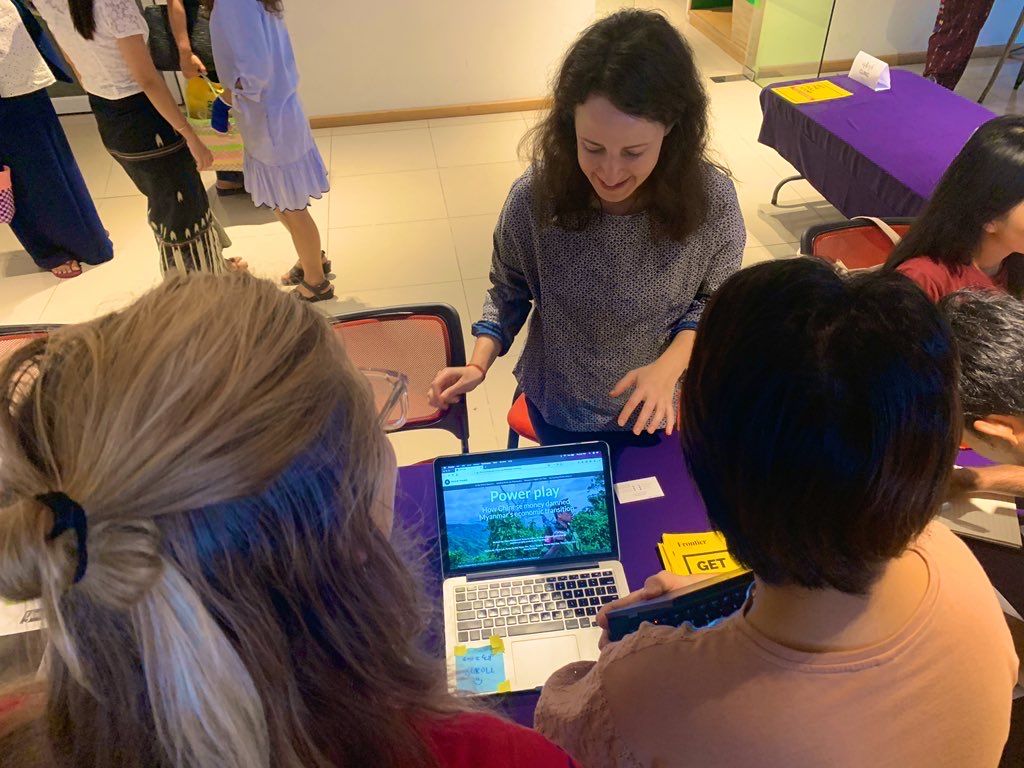Standing on the banks of the confluence zone that marks the start of the Myitsone River, it’s hard to imagine the place tourists were standing would be underwater if the infamous Myitsone dam were to be built, as Chinese authorities are pushing for it to be. It’s even harder to imagine the majority of the energy the dam would create would be sent to China, leaving the already-displaced villagers around the site without power.
But with the use of data we’ve been able to successfully illustrate this reality to our readers.
In a time where misinformation campaigns, a lack of available data and data transparency, and “dirty” data have made it harder than ever for journalists to accurately and fairly report on the rapidly changing landscape of Myanmar’s development, conflict, and politics, our project has been able to utilize data to support our investigative series Myanmar’s Looming Land Conflict Epidemic.
In the absence of any kind of transparent or coherent macroeconomic policy, data enabled us to figure out the winners, losers and cheaters behind China’s investment in Myanmar. For our dams reporting, we went after data on hydroelectric power sharing agreements and found one huge winner: China, one huge loser: the unelectrified communities in the flood plans and the cheaters: the state-owned power companies. The data also allows us to track that when citizens protested unfair agreements, China routed its money through neighboring countries instead. The same patterns hold for illicit financial flows. China reports a huge influx of jade imports from Myanmar, the Burmese government reports no such exports (and thus no taxes on them) and government-affiliated mining companies hoard the off-the-books money. The data allows us to quantify how unregulated investment exacerbates Myanmar’s yawning inequality and dependency on unfair economic agreements.
The next piece integrates geo-spatial data to take a more granular look at the socio-economic impact of a new trade corridor that cuts across the country. By tracking check-point locations, outbreaks of conflict, displacement patterns and drug busts, what emerges is a picture of community collapse in the face of both licit and illicit money pumped into a region with weak rule of law. Instead of simply choosing a handful of victims to tell their stories, the data tells a more nuanced, contextualized narrative of the consequences of regulatory failure to protect civilians from abuse, extortion and exploitation prompted by above-board investment in the region.
Our final two stories will tackle two extremes with data: the first will use geo-spatial data to track China’s entirely illicit investment in the mining sector by applying machine learning to identify illegal mining sites through deforestation patterns, using legal mine sites to train our model. The second will apply an algorithm developed by an environmental NGO to imagine a different future for Myanmar: if all the land currently dedicated to agro-industry or short-term rice farming, were to be repurposed to maximize its food yield to meet the nutritional demands of the Myanmar people. The data will allow us to project the socio-economic situation of citizens under an economic policy that prioritized the immediate development needs of citizens through a robust agriculture policy designed to feed the nation.
We’ve also worked to make our data open source-available in both Burmese and English So that we can help strengthen Myanmar and Southeast Asia’s growing data sources and community.
In late 2019 we presented our project at a data fair geared towards the Myanmar data community, sparking further collaboration with local data specialists. A month later we also presented our project at the Hong Kong Baptist University Society of Publishers in Asia (SOPA) Winners Forum, where we discussed the importance of data in journalism with university students from Hong Kong, mainland China, and beyond. At each of these events it was clear to us that data will be a focus on journalism in the region for years to come.
